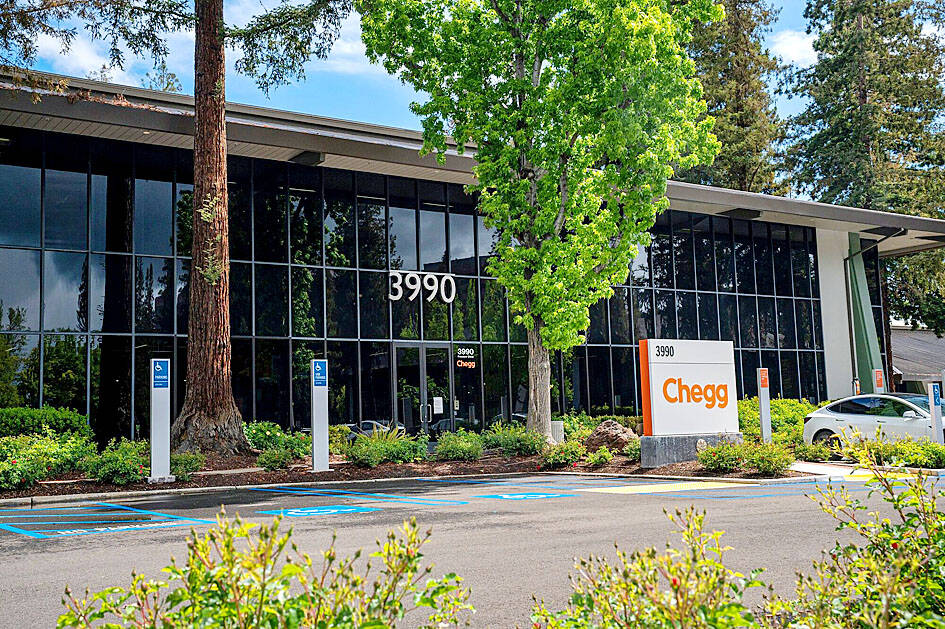Shares in companies that specialize in publishing school textbooks and offering online classes took a big hit on Tuesday after signs emerged that artificial intelligence (AI) bots such as ChatGPT were eating into their business.
Silicon Valley-based Chegg Inc, an education tech company that provides online homework help and textbooks, on Monday said that the explosion of generative AI chatbots had hurt revenue.
“In the first part of the year, we saw no noticeable impact from ChatGPT on our new account growth and we were meeting expectations on new sign-ups,” Chegg CEO Dan Rosensweig told analysts.

Photo: Bloomberg
“However, since March we saw a significant spike in student interest in ChatGPT. We now believe it’s having an impact on our new customer growth rate,” he added.
Specifically, the 18-year-old company reported a sales drop of 7 percent over one year, as well as a 5 percent fall in subscribers.
The admission sent shock waves through the education tech sector, pushing Chegg’s share price down by 48 percent to close on Tuesday at US$9.08 and hammering similar companies, such as UK-based Pearson PLC, which lost 15 percent in London.
Rosensweig insisted that the students’ pivot to ChatGPT was a blip, and that clients who kept their faith in the company’s products “continue to choose us and retain us at high rates.”
He added that Chegg had launched its own AI-powered tool called CheggMate, which was tailored to students and based on GPT-4, the latest iteration of the technology created by Microsoft Corp-backed OpenAI which powers ChatGPT.
Chegg has in the past faced the same accusations addressed to ChatGPT of providing students with readymade ways to cheat, especially during the COVID-19 pandemic when test-taking was largely taking place online outside a teacher’s supervision.
While ChatGPT-style AI has largely been seen as a boon for the economy, the implosion in education tech stocks was the clearest example yet of the technology’s capabilities to assail a company’s bottom line.
Given the technology’s untested nature, experts believe that the companies most vulnerable to AI for now are businesses that require little specialization — such as call centers or tutoring services offered by Chegg and others.
For the time being, “you’re only going to see very specific kinds of tasks that people are willing to farm out to generative AI,” said Vishal Gupta, an associate professor at the University of Southern California’s Marshall School of Business.
These tasks are going to be “lower stakes” given the uncertainties about the technology, he added.

MULTIFACETED: A task force has analyzed possible scenarios and created responses to assist domestic industries in dealing with US tariffs, the economics minister said The Executive Yuan is tomorrow to announce countermeasures to US President Donald Trump’s planned reciprocal tariffs, although the details of the plan would not be made public until Monday next week, Minister of Economic Affairs J.W. Kuo (郭智輝) said yesterday. The Cabinet established an economic and trade task force in November last year to deal with US trade and tariff related issues, Kuo told reporters outside the legislature in Taipei. The task force has been analyzing and evaluating all kinds of scenarios to identify suitable responses and determine how best to assist domestic industries in managing the effects of Trump’s tariffs, he

TIGHT-LIPPED: UMC said it had no merger plans at the moment, after Nikkei Asia reported that the firm and GlobalFoundries were considering restarting merger talks United Microelectronics Corp (UMC, 聯電), the world’s No. 4 contract chipmaker, yesterday launched a new US$5 billion 12-inch chip factory in Singapore as part of its latest effort to diversify its manufacturing footprint amid growing geopolitical risks. The new factory, adjacent to UMC’s existing Singapore fab in the Pasir Res Wafer Fab Park, is scheduled to enter volume production next year, utilizing mature 22-nanometer and 28-nanometer process technologies, UMC said in a statement. The company plans to invest US$5 billion during the first phase of the new fab, which would have an installed capacity of 30,000 12-inch wafers per month, it said. The

Taiwan’s official purchasing managers’ index (PMI) last month rose 0.2 percentage points to 54.2, in a second consecutive month of expansion, thanks to front-loading demand intended to avoid potential US tariff hikes, the Chung-Hua Institution for Economic Research (CIER, 中華經濟研究院) said yesterday. While short-term demand appeared robust, uncertainties rose due to US President Donald Trump’s unpredictable trade policy, CIER president Lien Hsien-ming (連賢明) told a news conference in Taipei. Taiwan’s economy this year would be characterized by high-level fluctuations and the volatility would be wilder than most expect, Lien said Demand for electronics, particularly semiconductors, continues to benefit from US technology giants’ effort

‘SWASTICAR’: Tesla CEO Elon Musk’s close association with Donald Trump has prompted opponents to brand him a ‘Nazi’ and resulted in a dramatic drop in sales Demonstrators descended on Tesla Inc dealerships across the US, and in Europe and Canada on Saturday to protest company chief Elon Musk, who has amassed extraordinary power as a top adviser to US President Donald Trump. Waving signs with messages such as “Musk is stealing our money” and “Reclaim our country,” the protests largely took place peacefully following fiery episodes of vandalism on Tesla vehicles, dealerships and other facilities in recent weeks that US officials have denounced as terrorism. Hundreds rallied on Saturday outside the Tesla dealership in Manhattan. Some blasted Musk, the world’s richest man, while others demanded the shuttering of his